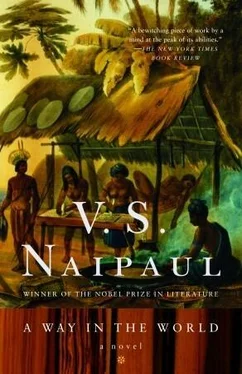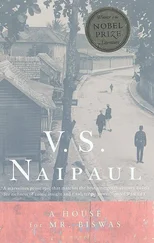Manuel Sorzano said, “I only talk Spanish at home, and the children only talk Spanish.”
A new land, a new name, a new identity, a new kind of family life, new languages even (Surinam Hindi would have been different from the Hindi he would have heard in Trini dad) — his life should have been full of stress, but he gave the impression of living as intuitively as he had always done, making his way, surviving, with no idea of being lost or in a void.
But just as it was strange that, with all the travelling he said he did, he didn’t know the dollar value of Venezuelan money; so it was strange that, with all his peasant need of what had survived in him, after a century of separation, of the religion of India, and the difficult concept of the deities, and the food and the music, and the reverences, he didn’t know that the language the mother of his nine children spoke was Hindi and not “Indian.” But perhaps it wasn’t strange: living intuitively, he was possessed by what had remained of his ancestral culture. He couldn’t stand back from it or assess it; he couldn’t acquire external knowledge about it; and it would die with him. He would have no means of passing it on to his children. They had Spanish names and spoke only Venezuelan. These Sorzanos would be quite different; there would be no ambiguities about them; they would be the kind of Venezuelan stranger I had in the beginning taken their father for.
I wanted to look at his gold-coin bracelet. He took it off and showed it to me. The coins were Victorian sovereigns. He opened his shirt and showed me more: he was wearing a heavy gold necklace with a big gold-coin pendant.
He had found gold in Venezuela: a gold hoard. And he had found it years before, not long after he had got to Venezuela, when he was working as a mixture of carpintero and day-labourer, and was one of a gang of twenty-five pulling down an old building in central Caracas. This was part of the great tearing down and rebuilding of old Caracas — rebuilding with motorways — after the oil. In one room, in a hollow in the mud-brick wall, he and two others had found the hoard, many sovereigns like those on his bracelet, and many coins like the one he now wore around his neck. That coin had been cast in 1824. It was big, intended to be historical, a statement of certainty, commemorating an event in 1818, the first Congress of the independent South American state that Simón Bolívar had tried to set up. It wasn’t a date I carried in my head: the coin was the first token I had seen of the grandeur of the ambition.
From the date of the English sovereigns it seemed that the hoard would have been hidden some time in the 1860s. So just thirty years or so after the coin had been struck, to mark the end of an old empire, an old order, and to bless the new, the coin had to be hidden away. In Venezuela and elsewhere in South America a century of disorder had followed the destruction of the Spanish empire. In 1869 the English writer Charles Kingsley, a great naturalist, in Trinidad for the winter, reported that there were no ships going up the Orinoco; that only one verminous vessel went from Port of Spain to La Guaira, the port for Caracas; and that after all the years of conflict life and property were still not safe in Caracas.
And just as the buriers of treasure at the time of the break-up of the Roman empire could have had no idea of the twists of history, the further great migrations, that would one day lead people unknown to them, people beyond their imagining, to turn up the treasure they had laid up for brighter days; so those people in old Caracas, at a time of darkness, amassing (almost certainly by plunder) a secret hoard of sovereigns and gold coins, could have had no idea of the twists of history that would lead Manuel Sorzano, whose ancestors in the 1860s had not yet left India, to come upon their gold.
He said, “Is how I buy my own house. I don’t have to put up with anybody bossing me around.”
I began to wonder whether that piece of luck — his wish to keep it or renew it or not to lose it — wasn’t bound up with his abstemiousness now, following perhaps upon some religious vow (marked, it may be, in Trinidad or Venezuela, by prayer flags in a garden).
I passed my thumb again over the coin commemorating the Angostura Congress. It was still so new, the raised letters of its vainglorious legend still sharp.
By a strange coincidence, the year in which it was struck, 1824, was the year in which, in that same Orinoco river town of Angostura, Dr. Siegert first produced his aromatic bitters. Some years afterwards the Venezuelan chaos, sweeping away the promise of the Congress, drove Dr. Siegert and his secret formula across the Gulf to Trinidad. As a British colony, Trinidad provided peace and commercial opportunity; at the same time, as a geographical outcrop of Venezuela, it provided all the tropical herbs and plants and fruits of Dr. Siegert’s formula. The town of Angostura in Venezuela was renamed after Bolívar; and now Angostura lived on as a name in the world not because of the Congress which the coin commemorated, but because of the bitters, made elsewhere.
I hefted the necklace again, to feel the weight of the gold, and gave it back to him.
I said, “I would be worried to carry that around.”
He made a little bow, and slipped the necklace over his neck with the swift practised gesture of a priest assuming a ritual upper garment. He gave two or three pats over the scattered twists of grey-black hair on his loose-skinned, old man’s chest, to settle the coin below his singlet; and he buttoned up his shirt.
“Is only like a souvenir for me. It safer like this than in the bank. If I take it to the bank, they would put me in jail. Is what happen to the two other fellows with me. Negro fellows, not from the islands, but from a place called Barlovento. A lot of old-time plantations there, and a lot of Venezuelan black people.”
It was one of the places in Venezuela where I had found again the vegetation of the little cocoa valley of my childhood. The old plantation barracks and the community of very black people (many of them working in the town now) had been a surprise. But Barlovento — the word meant “windward,” and to me was of the Caribbean — was also where one day I had driven for miles beside an unkempt cocoa estate with tall shade trees, through a smell of vanilla.
Manuel Sorzano said, “As soon as those black fellows see the coins, they just want to stuff their pockets and run. I tell them no, they will get catch. At first they listen to me, but then they begin to feel that I want to deny them something. So they just stuff their pockets and run. I stay behind, taking my time. I prise out a few more bricks, looking for a little more, and even finding a little more. Very quiet I start fulling my food-carrier. Three round enamel bowls one on top the other, in a metal frame or cage, with a handle on the top. I full that, the rice and bread and other food keeping the coins very quiet, and I keep my eye on it and went on working in another room, with other fellows, till it was time to knock off. When I leave the site with that food-carrier I was like a man walking on glass, I was so frighten of falling. In the evening I take the coins somewhere else. In the morning I went back to work, very quiet, making no fuss, and that same day we knock down the room where we find the coins. I just keep on doing my work, and sure enough in the afternoon five or six Guardia Nacional men come. They start going through the site like crazy ants. They not saying what they come for, but I know they looking for a room that already knock down. It was because of the black fellows. You wouldn’t believe what they do. They feel that all the gold make them important, and they take the coins to one of the biggest banks in Caracas, where everybody wearing suits. Imagine. Black fellows from Barlovento, dress the way they dress, talking with their twang, and going into this big quiet air-condition bank and saying they have gold coins. Of course the people in the bank call the Guardia, and the fellows get lock up and beat up, and they lose everything.”
Читать дальше












